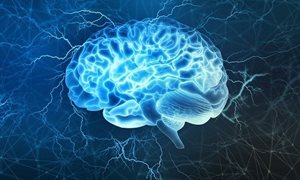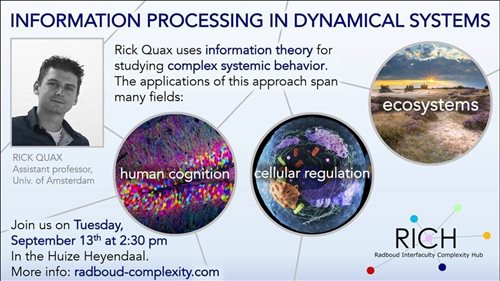
You are cordially invited to the 3rd Radboud Interfaculty Complexity Hub (RICH) Lecture on Tuesday, September 13th at 2:30 pm. Dr. Rick Quax (UvA) will give an intriguing lecture on Information Processing in Dynamical Systems (see abstract below). Please spread this invite within your network(s).
This event will take place in a hybrid format: online (link to follow) and in-person. Please note the physical location is Huize Heyendael (Map). Due to limited space, please let us know if you would like to join physically as soon as possible via reply to this invite or by direct email to info@radboud-complexity.com.

(in case the above image does not display correctly, see the attached flyer)
Title: Information processing in dynamical systems
Abstract: A network of dynamical units can generate a complex systemic behavior. Examples include human cognition emerging from a network of neural cells, ecosystems from food webs, and cellular regulatory processes from protein-protein interactions. A first important question is: which agents are the ‘drivers’ of the systemic behavior? A second question is: can we detect emergent phenomena, such as susceptibility to certain perturbations while being resilient to other perturbations? We attempt to address these questions in a domain-free way using information theory. As an example, a surprising finding is that the most influential nodes are not the most well-connected or central nodes. We also find that strategic multi-interventions may be far more effective than local interventions, and that achieving tipping points may even require a sequence of interventions. These insights have important consequences for many applications. I will present work on addressing the above questions through analytical results, computational modeling, and data analysis.
Bio: Rick Quax is an Assistant Professor in the Computational Science Lab of the University of Amsterdam and a Resident Fellow of the Institute for Advanced Studies. Furthermore he is a board member of the Dutch Chapter of NetSci; a board member of the Dutch Institute for Emergent Phenomena; and a member of the Netherlands Platform for Complex Systems.
He is fascinated by the emergence of complex systemic behavior which arises from the interactions of simple elements. Examples include human cognition arising from neurons and synapses; cellular regulatory processes arising from proteins and RNA; flocking patterns arising from birds and fish; and societies arising from individuals. There is currently no universal method to understand or predict such complex, emergent behaviors. He works on various types of applications in various collaborations, including the immune system, health and well-being, finance, and psychopathology, in the hope of transferring knowledge across domains as well as identifying universalities in their emergent properties.
